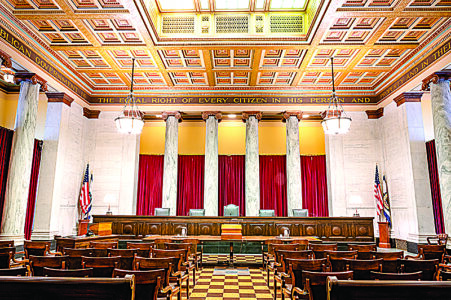Supporters, Opponents Of Education Rule-Making Law Weigh In

The West Virginia Supreme Court of Appeals Courtroom in the WV state capitol building in Charleston, WV. September 26, 2019 (J. Alex Wilson)
CHARLESTON — As the West Virginia Supreme Court of Appeals prepares to consider a legal challenge to a new law attempting to place education rule-making authority in the hands of lawmakers, opponents and at least one supporter have weighed in.
Multiple organizations filed amicus curiae briefs last week with the court in a case brought by the state Board of Education and State Superintendent of Schools Michele Blatt against Secretary of State Kris Warner challenging House Bill 2755, requiring rules created by the Department of Education and approved by the state board to be submitted to the Legislature for further approval.
The board is seeking a writ of mandamus from the Supreme Court to compel the Secretary of State’s Office to publish proposed rules in the State Register and to declare HB 2755 unconstitutional.
The bill, which went into effect in July, requires that all legislative rules enacted by the state board must first be authorized by the Legislative Oversight Commission on Education Accountability.
The proposed rules would then be submitted to the full Legislature for review, which could result in approval, amendment or rejection.
In a 1988 decision over a similar law, justices determined that legislative approval of state board rules was unconstitutional.
In both 1989 and 2022, the Legislature adopted joint resolutions to place on general election ballots constitutional amendments to give education rule-making approval to the Legislature, but voters rejected both. The 2022 proposed constitutional amendment failed in a 58% to 42% vote.
To date, the Supreme Court has received six amicus curiae briefs – also known as friend-of-the-court briefs – which are designed to provide justices with additional information and arguments by interested groups and/or individuals who are otherwise not parties to the lawsuit. Five of those briefs support the state board’s case, while one – filed by the conservative Cardinal Institute for West Virginia Policy – supports the legality of HB 2755.
Attorneys for the Cardinal Institute argued that West Virginia Board of Education v. Hechler, the earlier 1988 state Supreme Court decision, was flawed by allowing the state board to usurp the authority of the Legislature under the state Constitution.
“It improperly gives a part of the executive department – the Board of Education – the power to block the legislative department’s exercise of its power to review and approve its rules where other parts of the executive department do not have that same blocking power,” wrote attorney Mark Sadd. “Hechler has conferred a quality of independence on the Board of Education that it cannot have under Article V of the West Virginia Constitution. …The Board of Education is a Constitutional body but it is thereby not independent of the executive department.”
“If rulemaking of the Board of Education is immune from legislative review and approval notwithstanding HB 2755, then all action of the Board of Education also must be immune from the exercise of any legislative power whatsoever,” Sadd continued.
But other friend-of-the-court briefs argue that HB 2755 flies in the face of constitutional case law, which places general supervision of public education under the state Board of Education.
“House Bill 2755 would place unconstitutional limits on the Board’s constitutional authority to oversee the State’s public schools and the Board’s ability to make educational decisions based on the best interests of students,” wrote attorney Marc Williams, representing the West Virginia Parent Teacher Association.
“House Bill 2755 is a hornbook example of one branch of government treading upon the constitutionally derived powers of other branches, which is an outcome our system of checks and balances, as well as this Court’s binding decisions, cannot abide,” Williams continued.
“The West Virginia Legislature has attempted to usurp the supremacy of the West Virginia Constitution, previously confirmed by this Court, through the enactment of House Bill 2755,” wrote Lauren Motes, an attorney representing West Virginia Association of School Administrators and the West Virginia School Board Association.
“Education should be removed from partisan politics,” Motes continued. “With the rulemaking authority solely in the hands of the State BOE, it is ensured that West Virginia’s county school systems benefit from expertise-driven policy, dedicated educational focus, the convention and input of qualified expert stakeholders, and consistency and continuity.”
In a brief filed on behalf of constitutional law professor Derek W. Black and the Educational Law Center, attorney Joshua Weishart argued that the state board’s constitutional independence and inherent rulemaking authority align with the majority of other states’ constitutional structures for education.
According to Weishart, 35 state constitutions establish a state-level education entity, such as a state superintendent or state board of education, while 24 states mandate both.
“Since the current version of (the state Constitution) was enacted in 1958, this Court has repeatedly affirmed that the Board is an independent body constitutionally imbued with the power to supervise public schools, and that it specifically has the authority to regulate without interference by the legislature,” Weishart wrote.
“In Hechler, the Court dealt with, and roundly rejected, an attempt by the legislature – strikingly similar to the one at issue here – to usurp the Board’s rulemaking authority wholesale,” Weishart continued. “Since Hechler, the Court has reiterated these holdings numerous times. “Consistently, the Court’s basis for upholding the Board’s independent rulemaking authority is the principle that ‘constitutional grants of authority … cannot be derogated or eliminated by legislative or executive action.'”
Amicus curiae briefs have also been filed by the West Virginia chapter of the League of Women Voters and Education West Virginia, a teacher’s union born from the merger of the West Virginia Education Association and the state chapter of the American Federation of Teachers.
The Secretary of State’s Office, represented by the Attorney General’s Office, has filed its response to the state board’s lawsuit, but it exceeds a page limit. The Attorney General’s Office filed a motion Monday to exceed page limits, which is awaiting approval for from the Supreme Court.





